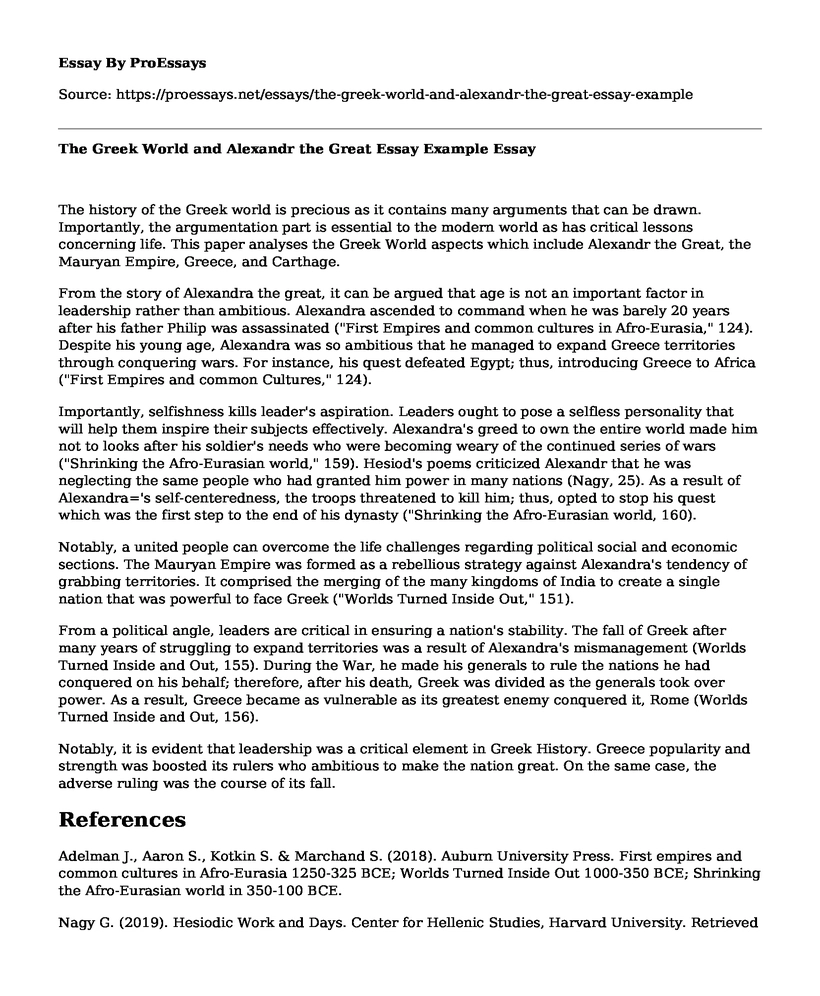The history of the Greek world is precious as it contains many arguments that can be drawn. Importantly, the argumentation part is essential to the modern world as has critical lessons concerning life. This paper analyses the Greek World aspects which include Alexandr the Great, the Mauryan Empire, Greece, and Carthage.
From the story of Alexandra the great, it can be argued that age is not an important factor in leadership rather than ambitious. Alexandra ascended to command when he was barely 20 years after his father Philip was assassinated ("First Empires and common cultures in Afro-Eurasia," 124). Despite his young age, Alexandra was so ambitious that he managed to expand Greece territories through conquering wars. For instance, his quest defeated Egypt; thus, introducing Greece to Africa ("First Empires and common Cultures," 124).
Importantly, selfishness kills leader's aspiration. Leaders ought to pose a selfless personality that will help them inspire their subjects effectively. Alexandra's greed to own the entire world made him not to looks after his soldier's needs who were becoming weary of the continued series of wars ("Shrinking the Afro-Eurasian world," 159). Hesiod's poems criticized Alexandr that he was neglecting the same people who had granted him power in many nations (Nagy, 25). As a result of Alexandra='s self-centeredness, the troops threatened to kill him; thus, opted to stop his quest which was the first step to the end of his dynasty ("Shrinking the Afro-Eurasian world, 160).
Notably, a united people can overcome the life challenges regarding political social and economic sections. The Mauryan Empire was formed as a rebellious strategy against Alexandra's tendency of grabbing territories. It comprised the merging of the many kingdoms of India to create a single nation that was powerful to face Greek ("Worlds Turned Inside Out," 151).
From a political angle, leaders are critical in ensuring a nation's stability. The fall of Greek after many years of struggling to expand territories was a result of Alexandra's mismanagement (Worlds Turned Inside and Out, 155). During the War, he made his generals to rule the nations he had conquered on his behalf; therefore, after his death, Greek was divided as the generals took over power. As a result, Greece became as vulnerable as its greatest enemy conquered it, Rome (Worlds Turned Inside and Out, 156).
Notably, it is evident that leadership was a critical element in Greek History. Greece popularity and strength was boosted its rulers who ambitious to make the nation great. On the same case, the adverse ruling was the course of its fall.
References
Adelman J., Aaron S., Kotkin S. & Marchand S. (2018). Auburn University Press. First empires and common cultures in Afro-Eurasia 1250-325 BCE; Worlds Turned Inside Out 1000-350 BCE; Shrinking the Afro-Eurasian world in 350-100 BCE.
Nagy G. (2019). Hesiodic Work and Days. Center for Hellenic Studies, Harvard University. Retrieved from https://chs.harvard.edu/CHS/article/display/5290. Accessed on April 6, 2019
Cite this page
The Greek World and Alexandr the Great Essay Example. (2022, Dec 21). Retrieved from https://proessays.net/essays/the-greek-world-and-alexandr-the-great-essay-example
If you are the original author of this essay and no longer wish to have it published on the ProEssays website, please click below to request its removal:
- My Critical Reflection of the Media Campaign: 'Holocaust on Your Plate'
- Current News Story That Relates to the Old Testament - Essay Sample
- Essay Sample on Medusa as a Powerful Creature
- Essay Sample on 13th: America's Prisons are the New Plantations
- Exploring Mythology & Liminality: A Study of Ancient Greek & Roman Myths - Essay Sample
- Essay Example on 12 Years a Slave: A Detailed Review of Racism, Slavery, and Justice
- All Quiet on the Western Front: Exploring the Experiences of Young Soldiers in WWI - Free Paper







